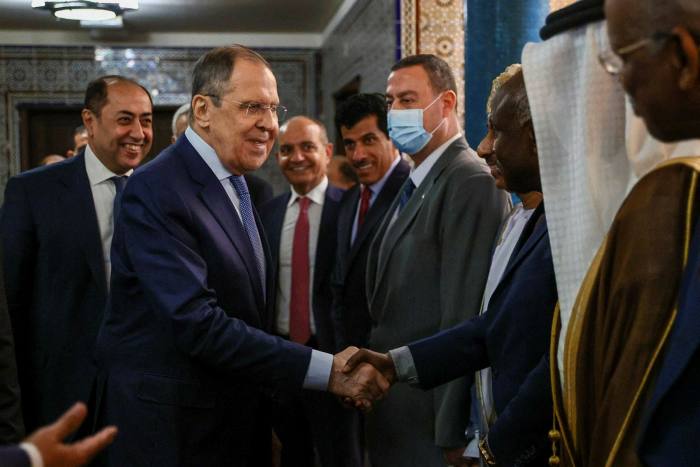Sergei Lavrov was looking for signs of friendship in Africa at a time when the global food crisis sparked by Moscow’s invasion of Ukraine is hitting the continent. He found some.
The greeting that Russia’s foreign minister received from Congo’s longtime leader Denis Sassou Nguesso on Monday, and the amicable meeting with Egypt’s president Abdel Fattah el-Sisi a day earlier, showed that Moscow’s top diplomat remains welcome among the continent’s leaders.
Lavrov’s tour of Egypt, Republic of Congo, Uganda and Ethiopia comes as African countries struggle with soaring food and fertiliser prices. Although the west has sought to isolate Moscow over the conflict, the welcome he has received has showed the strength of the Kremlin’s influence on the continent.
“What the west classifies as a pariah nation does not necessarily hold sway in the rest of the world,” said Comfort Ero, president of the Crisis Group think-tank. “For Russia, it’s about building up alliances and showing the west it hasn’t won the narrative.”
The impact of those efforts could be seen in March when 17 African countries abstained from a UN General Assembly vote to condemn the invasion of Ukraine. Eight others were absent. One voted against.
Ero said Russia had successfully reactivated old Soviet-era ties from a time when Moscow was viewed as more sympathetic than many western capitals to the cause of liberation struggles in Africa.

Moscow has in recent years built up a thriving arms and security business in several countries, and sent mercenaries to the Sahel and mining groups to the likes of Sudan and Central African Republic.
Lavrov, whose visit is due to end in Addis Ababa on Thursday, has sought to combat the idea that Moscow’s invasion of Ukraine led to higher food and fertiliser prices, Ero said.
Russia was “using all its communication tools to protect this narrative that the food crisis is not their fault”, said Ero, adding that many African nations blamed sanctions and the west’s inability to protect them from the fallout.
African nations were right to keep communication channels open to Moscow, according to Kamissa Camara, senior adviser on Africa at the US Institute of Peace. She said the approach had helped pave the way for this month’s agreement between Russia and Ukraine, however precarious, to reopen the key Ukrainian port of Odesa for wheat exports.
Senegal’s president Macky Sall, chair of the African Union, travelled to Russia to meet President Vladimir Putin last month. “President Putin expressed to us his readiness to facilitate Ukrainian wheat exports,” he tweeted after the meeting.
African leaders were adapting to a multipolar world in which “the centres of power are moving”, said Camara, a former foreign minister of Mali. As well as Russia, they were engaging with China and emerging powers including Turkey, the Gulf States and India, she said.

In francophone Africa, Camara added, some countries were actively embracing Moscow as part of a rejection of France, the former colonial power. The military junta in Mali has expelled the French military and enlisted Wagner, a Russian mercenary group, in its fight against a jihadist insurgency. Lavrov’s African tour coincides with the visit of France’s president, Emmanuel Macron, to Benin, Cameroon and Guinea-Bissau.
In Addis Ababa, where Lavrov is expected to spend time with prime minister Abiy Ahmed, Ethiopia is also seeking to balance different power blocs, said Abel Abate Demissie, an associate fellow at Chatham House, a think-tank.
Addis is seeking a rapprochement with the US after Washington imposed sanctions last year in response to the war in Tigray. Mike Hammer, special US envoy to the Horn of Africa, will visit Addis later this week.
The US is also making efforts to bolster political ties with countries across the continent. It is planning a summit of African leaders in Washington in December, the first of its kind since former president Barack Obama convened one in 2014. Russian media said Lavrov was discussing the agenda for the second Russia-Africa summit, due to take place in Russia next year.
In Uganda, President Yoweri Museveni was also seeking to play one power off against the other, Frederick Golooba-Mutebi, a Kampala-based political scientist, said.
“Museveni is a very mercurial character. He will say and do the right things to ingratiate himself with western powers if he needs something from them. And then, when he disagrees with them, he will march off and go to Russia, go to Iran, go to China,” he said.
Muhoozi Kainerugaba, Museveni’s son and a senior military commander who is seen as his heir apparent, tweeted at the start of the Russian invasion that “the majority of mankind (that are non-white) support Russia’s stand in Ukraine”.
But views on Russia differ across the continent’s political elite.
Earlier this month, the president of the Democratic Republic of Congo, Félix Tshisekedi, told the Financial Times that his country was not taking sides, although, at the UN, it did condemn Russia’s invasion of Ukraine. “I don’t want to take sides because these two countries have ties with the DRC. It is very unfortunate to see what is happening,” he said.
And, in Tanzania, opposition leader Zitto Kabwe has criticised what he sees as a dangerous flirtation with Moscow by some African countries.
“Yes, the Americans and their western allies invaded Libya,” he said of the intervention in 2011 that unleashed mayhem across the Sahel after the fall of longtime dictator Muammer Gaddafi. “But two wrongs don’t make a right and that doesn’t justify another country invading a sovereign state,” he said, referring to Russia’s invasion of Ukraine.
Stay connected with us on social media platform for instant update click here to join our Twitter, & Facebook
We are now on Telegram. Click here to join our channel (@TechiUpdate) and stay updated with the latest Technology headlines.
For all the latest Business News Click Here
For the latest news and updates, follow us on Google News.
